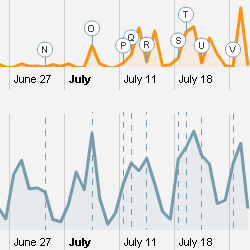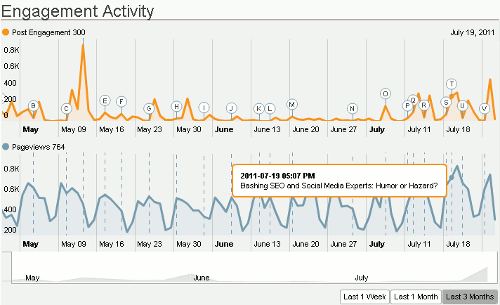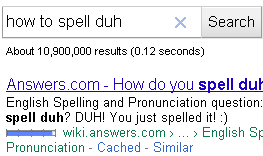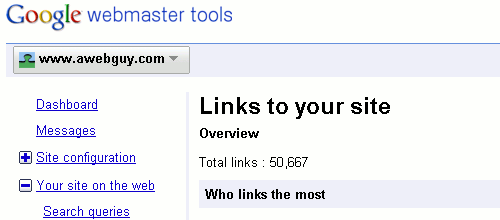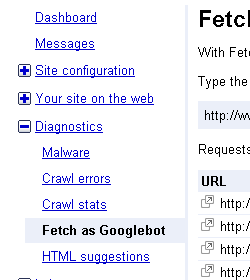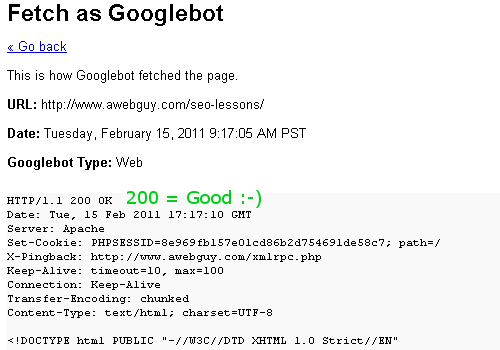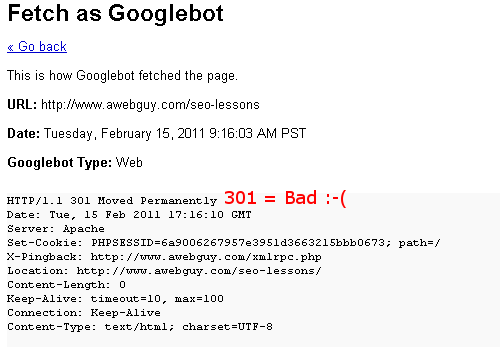
Your search engine ranking efforts may be hurting your business a lot more than you think! Whether you are the person handling your search engine destiny, or you have hired a search engine optimizer to handle it, this is information you should know. I’ll start with some simple facts.
Google makes frequent changes to their algorithm (roughly 500 per year). Yes, algorithm … the mathematical methods used to determine which websites will rank higher or lower in searches. On occasion, the changes are quite significant, such as the “Panda” series of updates (most recently Panda 2.5). We should expect changes, and it is a very good thing.
Google has a lot at stake in continuing to deliver the most relevant results when we go searching. From a search user’s standpoint, it is excellent, because it helps us find what we are looking for, easier and faster than ever. From a business standpoint, it is a huge cause for concern to many people, and often rightfully so.
Should you worry about Google’s changes? Perhaps yes, and perhaps no. Let’s see if I can answer that question. I’ll address some changes in layman’s terms, including a blast from the past that seems to be making a resurgence, which is “Google Bowling”, and it is not to be overlooked. In fact, I’ll explain how the methods of link building which many SEO sell to their customers is the same tactic other companies use to negatively affect competing websites. Please don’t click away if some of this seems too basic, or too advanced. There is value here, and I’ll make it easy to understand.
“This update is designed to reduce rankings for low-quality sites—sites which are low-value add for users, copy content from other websites or sites that are just not very useful. At the same time, it will provide better rankings for high-quality sites—sites with original content and information such as research, in-depth reports, thoughtful analysis and so on.”
Source: The Official Google Blog
I often challenge search engine optimization providers for their abuse of people’s fears by telling them SEO requires constant technology changes to keep up. What the abused SEO-buying public hesitates to understand is that SEO is not a function of technology. It is generally very untrue that search engine changes will adversely affect rankings based on technology issues. I have extensive proof of this in competitive markets where I have ranked websites at the top of searches, but made absolutely no changes. Some have not been touched in a decade, but still rank in the top one to three positions for competitive searches. Of course, that only happens if you are doing things above board, and not trying to cheat your way to the top … or paying somebody else to do it.
The problem that is hitting many websites hard with the new Google changes is that they have, either knowingly or unknowingly, used practices which Google has recently cracked down on harder than ever before.
What Google Changed in Panda Update … In Simple Terms
Some of the most recent Google algorithm changes are making a broad impact across the Internet. Big change always sends the cockroaches of the search engine optimization industry scurrying for a new patch of darkness. This time, the changes are in a series of updates called “Panda”, with the latest to date being called “Panda 2.5”. The focus of the updates is to wipe out some of the most prevalent and slimy tactics companies use to try and trick their way to top search engine rankings. I’ll share some reasons this could affect your online business future.

Unique Content Matters: Copycats Don’t Have Nine Lives!
One hard-hit area is companies taking content from other websites and re-purposing it on their own website. This can be as simple as a retailer re-using a manufacturer’s description, or a lazy content producer stealing somebody else’s work. An extremely hard hit area is auto-blogging, which automatically scrapes content from other websites to increase blog content. The more “innocent” instance uses automated means to replicate product descriptions from a manufacturer or supplier database. It happens a lot, and has been widely accepted for years, but many companies are finally seeing the downside. If you are unsure whether this is being done with your website, you may soon find out … the hard way.
What’s worse, is that a lot of people are paying search engine optimizers who use links from this kind of reduced-quality website to link to theirs. These dirty SEO tell the client that more links are a good thing, so they create thousands of them, but they don’t tell the client the rest of the story. It is extremely common, and very destructive, but I’ll get to that in a moment.
A huge number of websites are hit by Google’s more hard-line approach with Panda updates. It is often because somebody opted for the easy way, instead of the right way. This is the way of the dark side of the SEO industry, but somebody keeps feeding the SEO monster, and it’s not me.
I cannot call anybody a victim if this hits them in the wallet, because there are no victims. There are only “willingly confused“. Due diligence and common sense often go out the window when it comes to marketing, and especially as it applies to the Internet. People really want to believe that “easy success” actually exists.
Many people previously decided that the easy way is the better way, but its not true, and Google is proving it. It takes a lot of work to create truly excellent unique content that will perform well in searches. A lot of companies fell for the notion of trying to save money by using cheap SEO tactics and taking shortcuts, but Google is fighting back. Now people are finding out that the cost of shortcuts is a whole lot more than doing it right in the first place. If you who want to know “How much does SEO cost”, I suggest searching Google for it … but be sure to look for this article while you are there: “How Much Does SEO Cost?” is The Wrong Question. It won’t be hard to find … I wrote it.
Links Are Not Created Equal!
A tactic that Google is aggressively punishing is buying or trading links from other websites to make your website falsely appear more credible and “important”. This has always been a sore spot for Google, but more today than ever, as the Internet’s growth accelerates. Google wants to judge the Internet by what people like and find useful, and not things which have been falsely inflated by “content farms” and low-quality link gathering. It is why I have always spoken out against such tactics. An example is my article titled “Reciprocal Link Exchanges Don’t Work!“. I don’t think I can be a lot more clear than that.
Acquiring links is something that most search engine optimizers will tell you is very important. What too many of them don’t explain is that doing it the wrong way will, with near certainty, cause more harm than good. Link building strategies are not created equal, and a huge number of SEO are doing it totally wrong! It is another in a long list of lies SEO tell.
Google knows who links to your website, and who links to the websites that link to your website. There are no secrets here … if there is a link in a public place on the Internet, it is Google’s intent and responsibility to know about it. From all of those links, Google creates and evaluates the website’s overall link portfolio. It is a primary factor in determining what will be listed in search results, and where it will appear on the list. If the links in a website’s overall portfolio of links are not relevant, or are not what Google can logically (algorithmically) expect as a natural conclusion, the website will suffer.
Google Bowling and Bad SEO
I touched on some of the things Google does not like, but now, let’s imagine reverse engineering this. What if somebody else tried to make it look like you used these tactics? One way that seems possible is “Google Bowling”. That is the practice of buying or otherwise acquiring low-quality links to a competitor’s website in hopes of affecting a penalty against them from Google.
Wait! It seems crazy if there is actually a value in this kind of links that they could be used for harm, right? Well, there is not a value in them, and Google Bowling is a real thing … just google it. Directing a high volume of those low-quality links that so many SEO are selling is actually often used against competitors. It is an old trick, but it appears to be making a resurgence since Google’s Panda updates.
That is a dirty tactic, but does it work? Many indications show that it can and does work. Before you worry, here’s the good news: It will generally only have an affect against websites with a weak link profile. The bad news is that if you don’t have a mature and high-quality link profile, it may include you.
This came to mind recently, as I discovered nearly 300,000 new links pointing to my blog, here at “SEO and Social Media Marketing Blog”. They all sprung up in only a few days, which is a bad signal to Google of somebody buying links. Some people would surely say “Wow, that’s great! Hundreds of thousands of free links!” To say the least, I was not so delighted. Somebody is trying to Google Bowl my blog. I discovered it because of excessive Google Alerts, and also signals in my Google Webmaster Tools. See the example screenshot below.
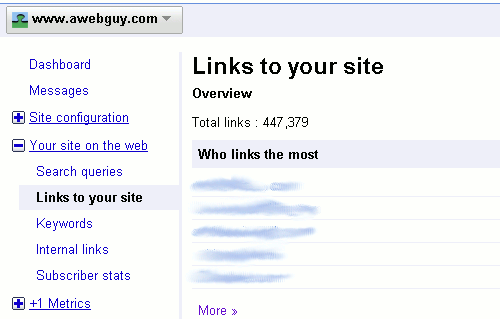
The good news is that I already had a baseline of over 150,000 incoming links. Some are good, while some are not so good, but it is a good balance. It is a mature link profile with a significant volume of high-quality links in the mix. If not for that, I would be worried, and with good reason.
With a good existing link profile, the worst scenario would be to file a reconsideration request with Google and explain the issue. With a link profile built on weak tactics, the challenge to recover becomes much more tedious, and emphasizes the value of being proactive.
Summary of Google’s Panda Update
When you have thousands … millions … billions, and even squillions of companies competing for the same space, it is pretty easy to see how trickery and fraud could flourish. It is easy for Google (and other search engines) to see this, too. They have billions of dollars at stake, and some of the brightest minds working to thwart that kind of trickery and fraud.
It should be no surprise why, as high search engine rankings became more challenging, the masses have scurried to try and figure out social media. Social media is an important signal which Google uses to measure a website’s value. In actuality, Google is the biggest example of social media there is. The links to and from websites are the most profound social measurement across all social media. It reflects what the people like and do not like. When that is faked, Google has a lot of ways to measure it.
As long as you are not sending false signals by trying to cheat search engines, you have little to worry about when they make changes. The sad fact is that many people are sending false signals, and they don’t even know it. They relied on search engine optimizers who offered a good pitch and a low price. The outcome is often far more costly than doing it right in the first place. Doing it right does not cost money, it pays money. Doing it cheap and haphazard is where the big cost comes in.
P.S. If you are the thumb-sucker behind trying to Google Bowl my blog, know this: People are sick of your kind of useless tactics. They already wasted their money trying it your way, and they are pissed. That’s why I often write about your type of SEO, and warn people. I suspect you are pouting like a wet toddler who never got enough love, but you won’t bump me from your favorite spot. Count on it!
Photo Credits:
Panda by geopungo via Flickr
Panda Floss by istolethetv via Flickr
Podcast: Play in new window | Download
